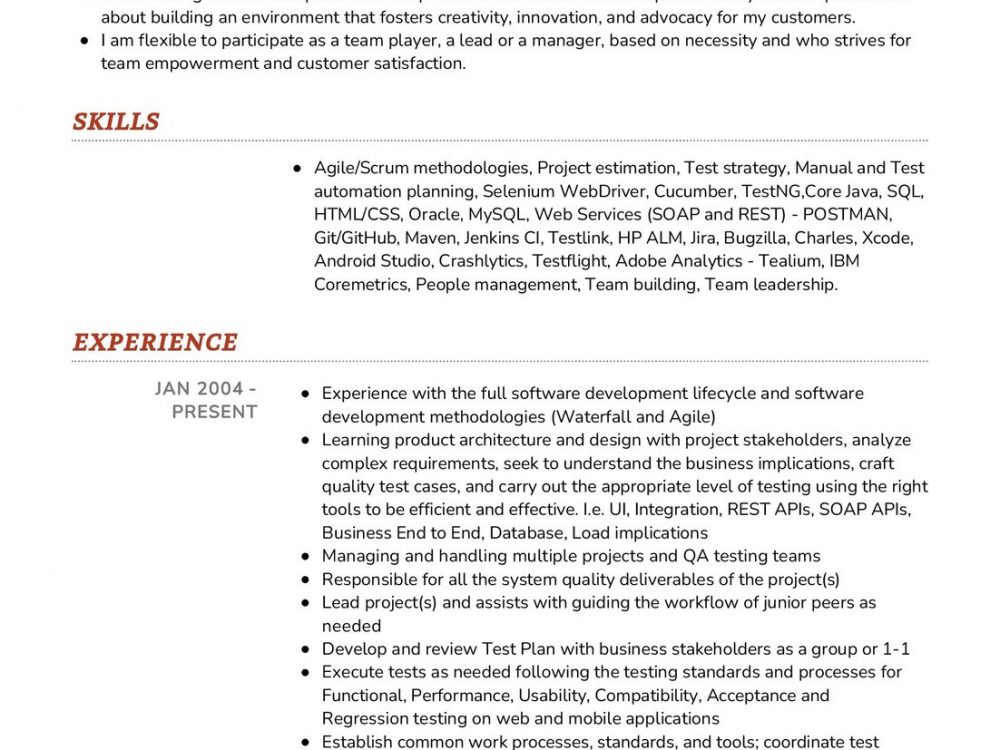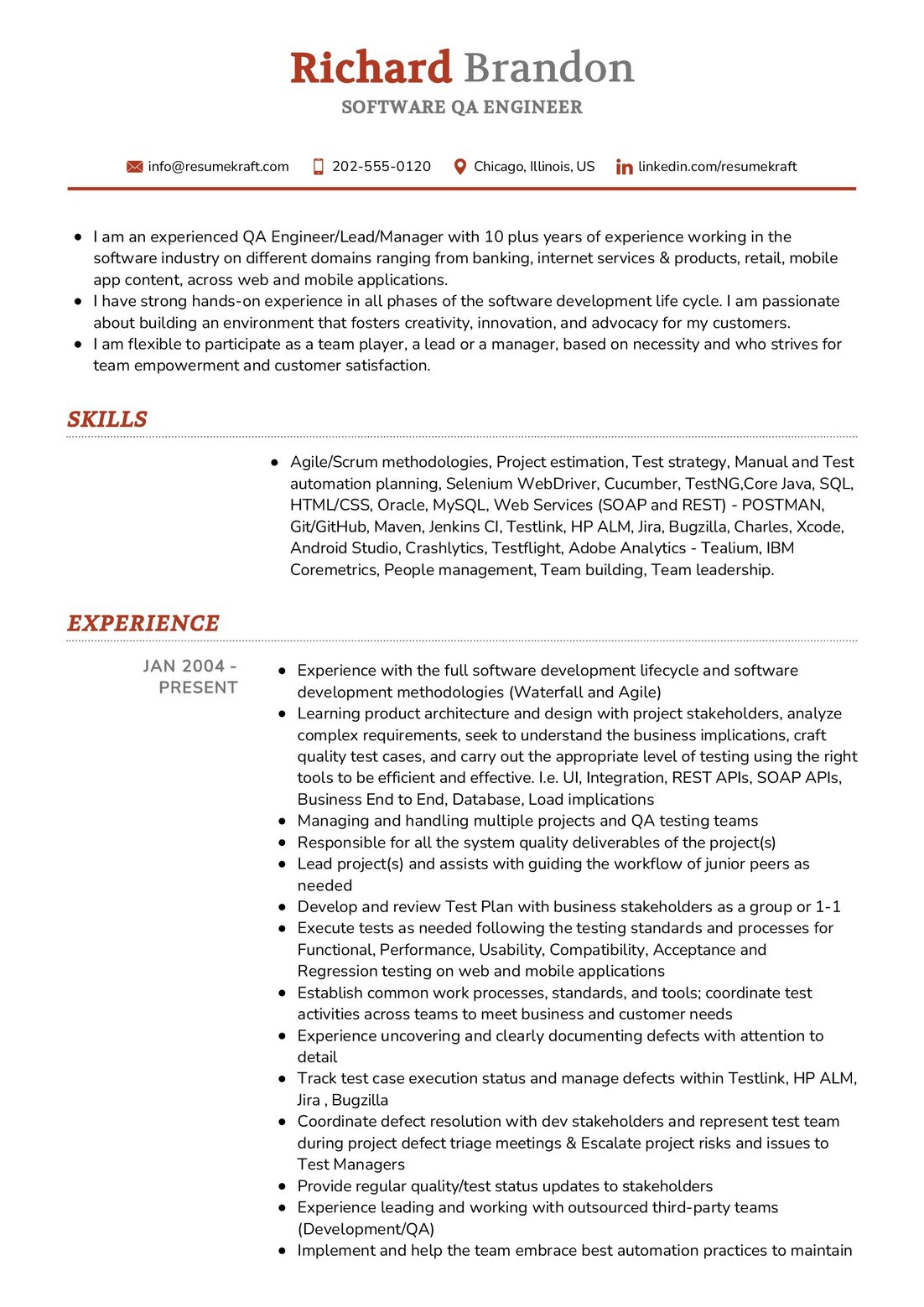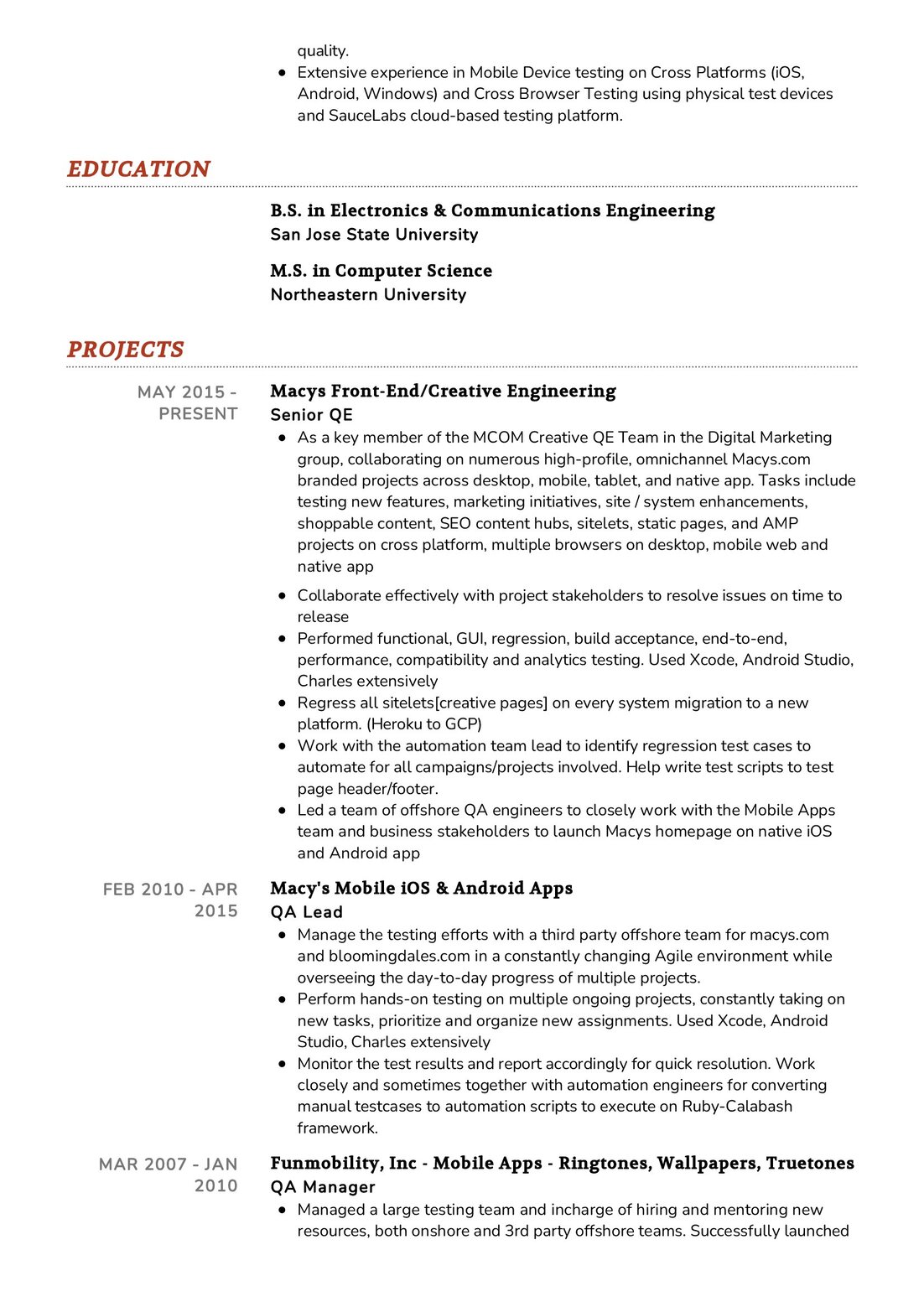Exploring the Role of a Software QA Engineer
In today’s fast-paced tech landscape, the role of a Software Quality Assurance (QA) Engineer is instrumental in ensuring that software products meet the highest standards of quality. This article will delve into the multifaceted responsibilities, required skills, and key tips for crafting an effective resume for a Software QA Engineer position.
What Does a Software QA Engineer Do?
The role of a Software QA Engineer is pivotal in the software development life cycle, focusing on identifying and fixing defects to ensure the final product meets user requirements. Let’s explore the diverse responsibilities that define this crucial position:
- Collaborating with development teams to understand software requirements and design comprehensive test plans.
- Executing test cases, both manually and using automated testing tools, to identify bugs and areas for improvement.
- Participating in the development process to ensure quality is built into the product from the early stages.
- Analyzing test results, documenting issues, and working closely with developers to resolve defects.
- Ensuring that software products comply with industry standards and regulatory requirements.
- Continuously staying updated on testing methodologies, tools, and industry best practices.
A Software QA Engineer’s role is not just about finding bugs but also contributing to the overall improvement of the software development process.
Software QA Engineer Job Requirements
Becoming a Software QA Engineer requires a combination of technical skills, attention to detail, and a commitment to quality assurance. Here are the key requirements to embark on this rewarding career path:
- A Bachelor’s or Master’s degree in Computer Science, Software Engineering, or a related field.
- Proficiency in testing methodologies, including both manual and automated testing.
- Experience with testing tools such as Selenium, JIRA, and others relevant to the software development stack.
- Strong analytical skills to understand complex systems and identify potential issues.
- Excellent communication skills to effectively collaborate with cross-functional teams.
- Knowledge of software development life cycle (SDLC) and agile methodologies.
- Detail-oriented mindset and the ability to think critically to ensure comprehensive test coverage.
Securing additional certifications in software testing, such as ISTQB, can enhance your profile and demonstrate your commitment to professional development.
Responsibilities of a Software QA Engineer
The responsibilities of a Software QA Engineer go beyond finding and fixing bugs. Let’s unravel the core duties that define this role, showcasing the importance of a QA Engineer in delivering high-quality software:
- Creating and executing test plans, ensuring comprehensive coverage of software features.
- Collaborating with developers to understand the technical aspects of the software under test.
- Automating repetitive testing tasks to improve efficiency and effectiveness.
- Participating in code reviews to identify potential issues early in the development process.
- Contributing to the improvement of QA processes and methodologies within the organization.
- Providing clear and detailed feedback to developers to facilitate the resolution of identified issues.
- Ensuring that software products meet usability, functionality, and performance requirements.
Each responsibility is a thread in the tapestry of software quality assurance, contributing to the delivery of reliable and user-friendly products.
Software QA Engineer Resume Writing Tips
Crafting a compelling resume is crucial for landing a Software QA Engineer position. Here are some tips to help you create a standout resume that reflects your skills and experience:
- Highlight your experience in creating and executing comprehensive test plans.
- Showcase your proficiency in testing tools and automation, emphasizing their impact on project efficiency.
- Include metrics that demonstrate the effectiveness of your testing efforts, such as defect discovery rates and test coverage percentages.
- Detail any experience with specific testing methodologies or frameworks relevant to the industry.
- Emphasize your ability to collaborate with cross-functional teams and communicate effectively.
Your resume is a snapshot of your expertise and achievements, so make it compelling and tailored to the Software QA Engineer role.
Software QA Engineer Resume Summary Examples
Your resume summary is the gateway to your professional story. Craft a powerful summary that encapsulates your skills and experience as a Software QA Engineer:
- “Results-driven Software QA Engineer with a proven track record of improving testing efficiency through automation and delivering high-quality software products.”
- “Detail-oriented QA professional with expertise in creating and executing test plans, collaborating with development teams, and contributing to process improvements.”
- “Experienced Software QA Engineer skilled in using industry-leading testing tools and methodologies to ensure the delivery of reliable and robust software solutions.”
Your summary should serve as a compelling introduction, encouraging recruiters to delve deeper into your resume.
Create a Strong Experience Section for Your Software QA Engineer Resume
Your experience section is the heart of your resume, showcasing the journey of your career as a Software QA Engineer. Provide detailed examples of your contributions to projects and the impact of your testing efforts:
- “Led the implementation of automated testing procedures, resulting in a 30% reduction in testing time and a 15% increase in defect discovery efficiency.”
- “Collaborated with development teams to identify and resolve critical issues, ensuring the timely delivery of high-quality software products.”
- “Contributed to the adoption of agile testing methodologies, leading to improved collaboration between QA and development teams.”
Your experience section should tell a story of your growth as a Software QA Engineer, highlighting key achievements and challenges overcome.
Sample Education Section for Your Software QA Engineer Resume
Your educational background is a cornerstone of your expertise. Here’s how you can present your educational milestones in the resume:
- Master of Science in Software Engineering, XYZ University, a journey of deep learning and specialization, 2017.
- Bachelor of Science in Computer Science, ABC University, the foundation stone of your IT career, 2015.
- ISTQB Certified Tester, a recognition of your expertise in software testing, 2018.
Highlighting your education, especially relevant certifications, adds credibility to your qualifications as a Software QA Engineer.
Software QA Engineer Skills for Your Resume
Your skill set is your toolkit, equipped with a diverse range of tools honed over the years. Here are the essential skills that a Software QA Engineer should possess:
Soft Skills:
- Attention to detail, ensuring thorough testing coverage and defect identification.
- Communication and collaboration, fostering effective teamwork with development and other cross-functional teams.
- Analytical thinking, the ability to understand complex systems and identify potential issues.
- Adaptability, staying current with evolving technologies and methodologies.
- Problem-solving abilities, finding effective solutions to testing challenges.
Hard Skills:
- Proficiency in testing tools like Selenium, JIRA, and others relevant to your software development stack.
- Automation testing, reducing testing time and enhancing efficiency.
- Knowledge of testing methodologies and frameworks, such as Agile and Scrum.
- Understanding of software development life cycle (SDLC).
- Experience with version control systems, ensuring consistency in testing environments.
Each skill in your toolkit contributes to your effectiveness as a Software QA Engineer, ensuring the delivery of high-quality software products.
Common Mistakes to Avoid When Writing a Software QA Engineer Resume
As you craft your resume, steer clear of common pitfalls that can hinder your chances of securing a Software QA Engineer position. Avoid the following mistakes:
- Using generic language without showcasing your specific contributions and achievements.
- Overloading your resume with technical jargon that might be unfamiliar to non-technical recruiters.
- Omitting relevant certifications or training, missing an opportunity to highlight your commitment to professional development.
- Ignoring the importance of a well-crafted cover letter to complement your resume.
- Failing to proofread, which can leave a negative impression on recruiters.
Avoiding these common mistakes ensures that your resume stands out for all the right reasons.
Key Takeaways for Your Software QA Engineer Resume
As you wrap up your resume, keep these key points in mind to ensure it effectively represents your skills and experience as a Software QA Engineer:
- Highlight your expertise in creating and executing comprehensive test plans.
- Emphasize your proficiency in testing tools and automation, showcasing their impact on project efficiency.
- Showcase metrics that demonstrate the effectiveness of your testing efforts.
- Detail any experience with specific testing methodologies or frameworks relevant to the industry.
- Highlight your ability to collaborate with cross-functional teams and communicate effectively.
Remember, your resume is your professional story, and crafting it well is essential for making a lasting impression on potential employers.
Finally, feel free to utilize resources like AI Resume Builder, Resume Design, Resume Samples, Resume Examples, Resume Skills, Resume Help, Resume Synonyms, and Job Responsibilities to create a standout application and prepare for the Software QA Engineer job interview.
Armed with these insights and tips, you are now ready to craft a resume that is a true reflection of your journey, your skills, and your aspirations. Best of luck!



